The generational gap
Differences between what generations value vary due to environment, technology & experience
Politics is not the only place that there is a substantial difference between generations. The Center for Generational Kinetics (CGK) reported that the three main trends that shape generations are parenting, technology, and economics.
January 26, 2021
Hated discussion about politics with her parents, both sides intensely arguing in support of their perspectives on abortion, climate change, the Black Lives Matter movement, or which Presidential candidate deserved to win the 2020 election, is a consistent occurrence for freshman Eve Whisnant.
Paul Taylor, a reporter and researcher who specializes in demographic change and generational trends, claimed that the United States is seeing the largest partisan age gap ever, and that, in the 2018 midterm election, the younger and older voters were extremely far apart in their partisan preferences. Taylor said that this age gap is even larger than the gender gap.
“I have very different opinions than my parents,” Whisnant said. “They are both Republicans who support Trump, and I am the complete opposite of that.”
Politics is not the only place that there is a substantial difference between generations. The Center for Generational Kinetics (CGK) reported that the three main trends that shape generations are parenting, technology, and economics.
“I think there is always going to be a difference between people of different ages and experiences because things do shift over time,” senior Isaac Dame said. “It is not necessarily about their character but more about the environment they grew up in.”
Investopedia, a website that provides financial information, defines the generation gap as a “chasm that separates the thoughts expressed by members of two different generations.” The website states that the generation gap can describe the differences in actions, tastes, and beliefs of younger generations versus older ones.
“I believe the youth of today [are] more accepting of people who are different than they are,” social studies teacher Patricia Maney said. “Today’s youth are compassionate, kind, accepting, and inclusive, where some folks my age did not show those traits when they were younger. I see [and] hear people, not teachers, say, ‘these kids today’, and I often respond with, ‘yes, they are so much better people than we ever were.’”
VALUES
In a student poll issued by The Dispatch on Dec. 2, the values of personal finance, family, gender identity, race, and religion were questioned. The poll found that, out of the five values mentioned, the majority of students valued racial issues the most.
“I would say that racial issues are incredibly important to me, mostly because of the current events that have been happening like the Black Lives Matter movement,” Whisnant said. “I also highly value gender identity because I believe people should be able to be whoever they want to be.”
Professors Daniel Kaplan and Barbara Berkman found that, in the United States, more than 90 percent of older people consider themselves to be religious or spiritual and that older adults’ level of religious participation is greater than any other age group.
“I think older generations are far less skeptical of religion than emerging generations,” Shepherd of the Hills Presbyterian Church Pastor Leon Bloder said. “Emerging generations do not trust the institutions that compose the Christian Church, for example, because of scandals within them that tarnish their reputation. I feel like this contributes to distrust in younger generations, who are becoming more and more likely to identify as ‘Spiritual but not Religious,’ as a result.”
EMPLOYMENT
Generation gap challenges in the workplace can include varying communication styles, different work ethics, different feedback expectations, a different understanding of work and life balance, and different ways to resolve conflict, according to business blog Deputy. However, research scientist Jennifer Deal noticed that all the generations now of working age value essentially the same things such as family, respect, trust, consistency and loyalty in the workplace.
“I think the stereotype of the lazy, self-centered Millennial is absolutely false,” Bloder said. “I think my younger employees work differently, but they work just as hard or harder, in some cases, than any of my other staff members. I do think that my younger employees are able to multi-task much more easily than their older counterparts, but they often need a little bit more direction and affirmation than my older staffers.”

POLITICS
According to an article published in Inside Higher ED, voters under the age of 30 heavily voted Democratic in the past election, favoring Joe Biden by 61 percent. Additionally, in both 2015 and 2016, about three out of ten Baby Boomers identified as conservative Republicans, which was the highest percentage dating back to 2000, according to the Pew Research Center. Pew Research found that 27 percent of Millennials described themselves as liberal Democrats, which is the highest share of any generation, and the rising Gen Z generation closely mirrors the political opinions of Millennials.
“I think that many of the cultural and social issues that have divided us so deeply over the past couple of decades – particularly those that are motivated by religious beliefs – are largely resolved in the minds of emerging generations,” Bloder said. “Based on my own kids, I feel emerging generations are more concerned with climate change, racial injustice, economic equality, and health care issues, whereas previous generations, especially in religious settings, were preoccupied with ‘single-voter’ issues like abortion and LGBTQ+ equality.”
Sam Peltzman, researcher for the Chicago Booth Review, found that the average American was likely to identify as politically liberal at 25, but was even more likely to be conservative 20 years later.
“Our political beliefs steadily become more conservative as we age, no matter what generation we belong to or what era we grew up in,” writer for the Chicago Booth’s Sarah Kuta wrote. “Young liberals should get comfortable with the fact that they will likely become more conservative as they age.
Bloder believes that older generations are not as engaged in the issue of climate change, or do not believe that the changing climate is an urgent problem.
“My dad and I have different beliefs when it comes to most scientific-related things like climate change,” Dame said. “He is much more unwilling and hesitant to take scientific consensus as facts and take it seriously, whereas climate change is something that scares me a lot.”
COVID-19
Jason Dorsey, President of CGK, wrote that one of the most shocking findings from a national study, which was conducted to provide data about COVID-19 across generations, was that Gen Z reported the greatest change in responsibilities, more so than Millennials, Gen X, and Baby Boomers.
“In my family, there are differences between how my grandfather and I have responded to COVID-19,” Dame said. “I would say that I am more worried about the pandemic, in a sense of how it impacts everybody, than he is. I personally would not go out without a mask while he might have to be reminded. There are also other reasons besides generational beliefs as to why people might respond differently.”
Mental health resource Verywell Mind found that older people are more susceptible to the health complications from COVID-19, but younger generations are the most worried about the pandemic. Verywell Mind also reported that older generations seem to be more worried about health, family, and finances while younger people are more worried about stress and housing.
“I’m a Gen-X’er so my generation can kind of live with one foot in the virtual world and one outside of it, pretty easily,” Bloder said. “But the older folks in my church have been mixed in the way they’ve dealt with things. We have had an increase in folks who are depressed, anxious, lonely, isolated, and more. Younger people to some extent were already living online pre-COVID so it was not the same kind of shift. But I do see my own kinds longing for in-person connections with their friends, too.”
THE MEDIA
Gen Z is the first generation that has never known a world without the internet. Visual Capitalist found that Gen Z spends longer using social media sites per day on average than any other generation.
“A lot of the differences between me and my parents are because of social media,” Whisnant said. “Social media definitely influenced me, mostly by shaping some of my political beliefs.”
Sustainability company Iberdrola claims that Gen Z is a group of people “marked by the internet,” whose use of technology has led to the generation neglecting their interpersonal relationships, being good multi-taskers, having a short attention span, and being more interested in social issues than other generations.
“While Generation Z’s lifetime immersion in technology that most of us simply did not grow up with might seem to be a boon in terms of their navigating current cultural and social changes, the reality is almost counterintuitive: Generation Z addresses new technology as an “extension of themselves” rather than an addiction or compulsion,” writer Julian Vigo wrote for Forbes.
Older and younger people spend their time on the internet on different social media sites, according to Dame; older generations frequently use Facebook while younger generations spend more time on Twitter, Instagram and TikTok. Dame believes that the differences between social media usage could lead to a greater divide.
“There’s going to be differences between young and old people, there always are, but I think the internet is a pretty big part of it” Dame said. “A lot of the differences between the generations exist because of the internet.”
Despite the negative impact that technology has had on society, especially Gen Z, Maney believes that technology and social media can lead to better and more in-depth education.
“Modern technology has helped students learn about other cultures in real-time,” Maney said. “I believe people change with education. It helps them realize there is a huge world consisting of differences in cultures, religions, language, [and] customs, and learning about these things helps us to grow as individuals.”
BRIDGING THE GAP
William Frey, author and member of the Brookings Institution Metropolitan Policy Program, suspects that if the division between ages continues into the next decade, issues like social conflicts are sure to intensify. Frey claims that officials from all levels of government need to help their constituents understand the value of co-generational dependency between older and younger people.
“My parents were much more conservative than I am,” Bloder said. “They were definitely people of their times. But my values I share with my parents are foundational, a good work ethic, the importance of faith, the joy of family, those are all important to me.”
While Dame believes that there will always be differences between the generations, he believes that connections between older and younger generations is necessary if there is going to be progress towards bridging the gap.
“I think it is important for the generations to come together and hold similar values,” Whisnant said. “Without attempting to come together, there will always be a divide between generations. I think the reconciliation could happen by younger and older people communicating with one another.”
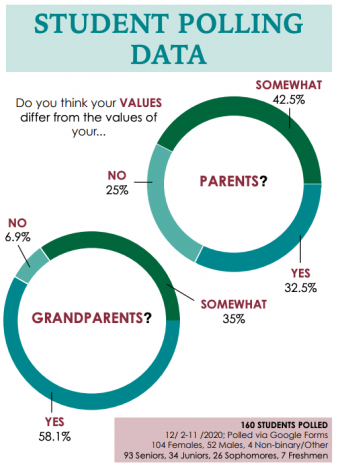



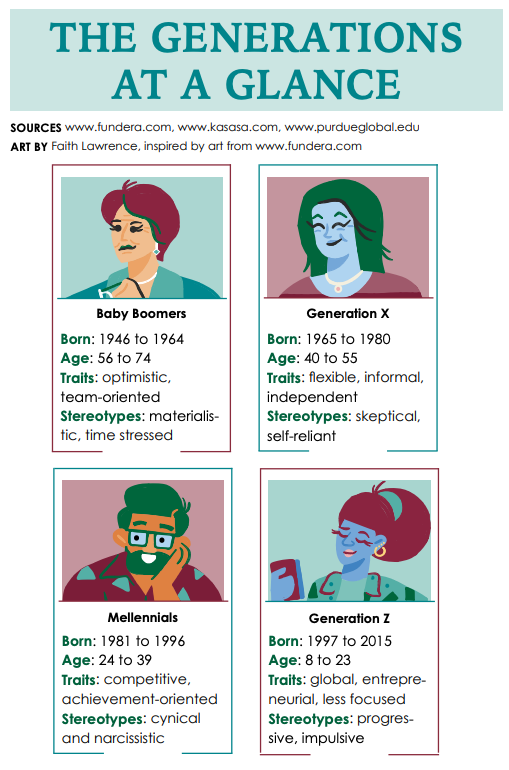
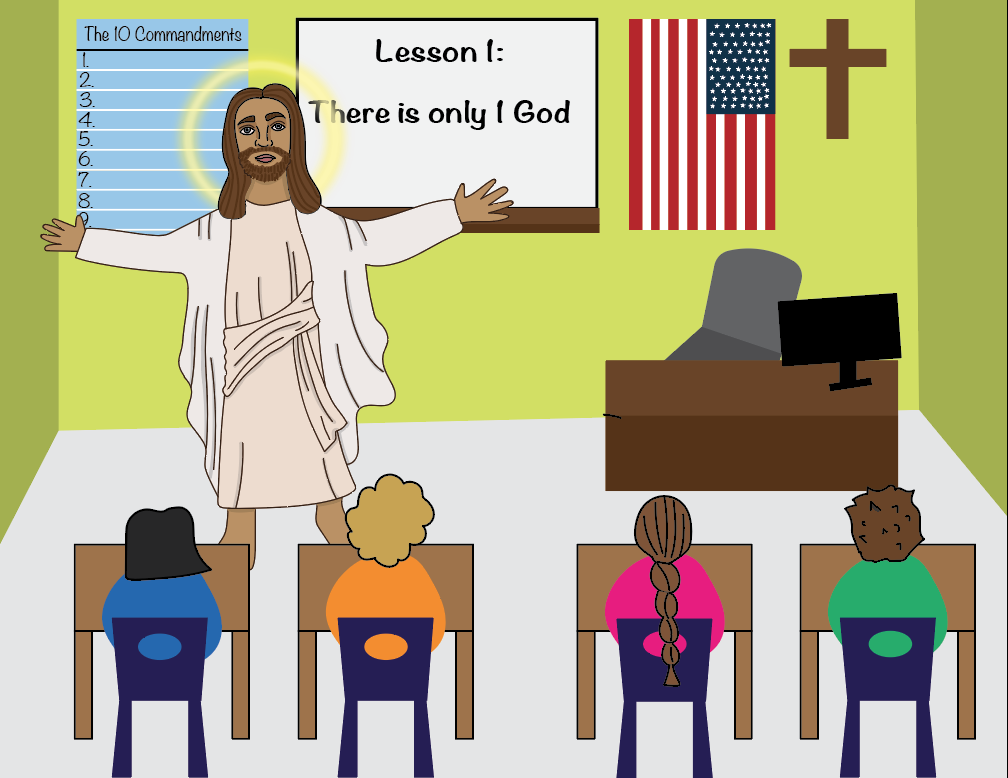




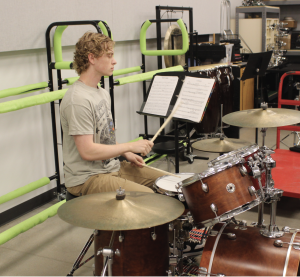
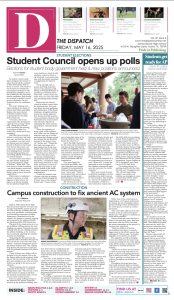
Pops • Mar 1, 2021 at 2:49 pm
Faith, I really enjoyed this article. It was extremely well written, well organized, and the subject is very pertinent in today’s world. I was impressed with your approach to the generational differences today as opposed to past generations, a subject which, for me, is very troubling. Your treatment of the people interviewed and reported on was very good also. You demonstrated a balanced and nonjudgmental
approach to the subject and to the different viewpoints expressed, which, as I’m sure you know from reading newspapers yourself, is very rare thee days
Congratulations and keep up the fine work.